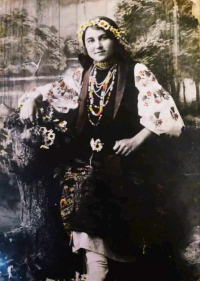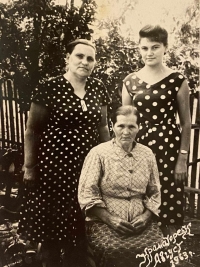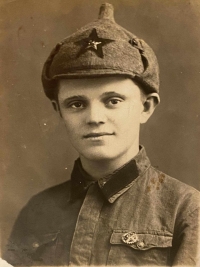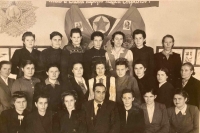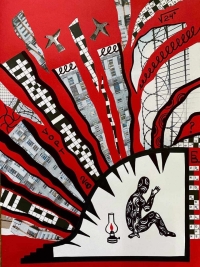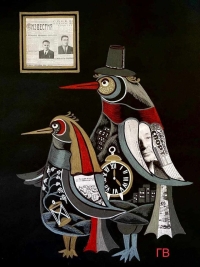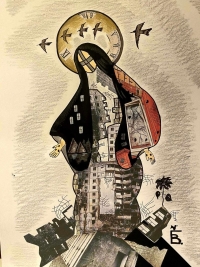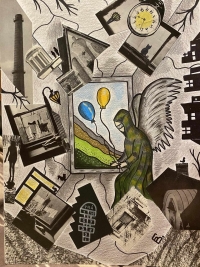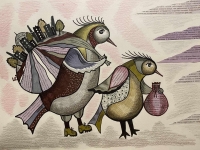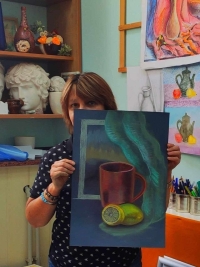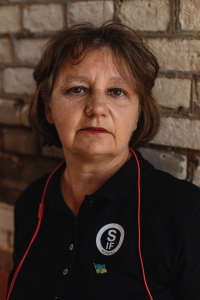I have a friend, she’s a volunteer. And she says, “Vita, I’ll go volunteer at the railway station.” I thought I’d go too. We didn’t agree on a time. I said, “Okay, I’ll go too.” She said, “Come.” And it was when there were those [evacuation] trains there, there were a lot of people. I said, “I’ll come too.” And I’ve just gotten ready. There had already been no work. Well, the shop is open, the door is open. What work, anyway? I came just out of habit. You had to do something. And that’s when my acquaintance comes in. She says, “Vita, let’s drink coffee.” She’s very worried. Well, all that. I say, “Okay.” I turn on the kettle. The kettle hums. She comes in with those candies. And the explosions began. My windows shatter. We drop to the floor and crawl toward the back room, an old room. Right there. There were people in the shop. Another acquaintance had entered. You know, just some gawkers stopping by to see the monuments. Well, that's just it. They visit, customers visit. I mean, they also dropped to the floor. I said, “Crawl there.” And they crawl. Everything was covered in dust. One of the monuments fell down. It was very loud. Just scary. It was scary. All the monuments are in these — "Korivka” [candies]. And it's quiet. And we're slowly coming out. It's quiet. And there was one bang and a lot of bangs. I mean, there, it seems, something fell and exploded. I don't know much about these shells. And a lot of them... Not just one blast and that's it. No. It went on and on and on for a long time. And then we go out, we look towards the railway station. There's smoke. And we get a little closer. We get closer. I can distinctly hear screaming. People screaming. People. It's just like... men, women. It's just like wailing, screaming. And people are running out of the station. They're just running. Some of them carrying things. And we didn't go closer. And they're coming. I mean, I started talking to somebody. They crowded into the store. All bloody. Well, not all of them. Some of them are covered in blood. I said, "Maybe [you need] some help?". It's not their blood, actually. An Armenian family came there. They resuscitated this grandmother. They are all in one piece. One woman was my age, give or take. She was hysterical. She didn't know where I was, what I was doing. I started yelling curses at her. She sees a stranger yelling at her. I said, "Well, come on, come to your senses." She says, "I don't understand. I was there." Well, seems like it's that kind of thing. I say, "Who are you with?" — "Alone." — "Do you have someone to call?" — "I do." — "Make a call." — "What do I say?" So the person is in this [shock]. Well, I stayed with her. She started... "Well, call at least someone." She started calling her husband. I see she's already, like, talking. Then she left. Then she said thank you. I said, "Got someplace to go?" She says, "Young lady, thank you. Because I didn't know where and what I was." Many people were like that. There was a man sitting there covered in blood. Well, he's in one piece. I said, "You want something?" He says, "No, no, no. It's all right." And this whole crowd, the whole Tryumfalna [street] was covered in drops of blood. On Shkilna [Street], there was a crossing, an arch, [it was covered] too. It was scary. They flowed out. Some went to the Bykov BK [House of Culture]. Some went to the church across the street. <...> Later, we went. We didn't come anywhere near the station. We just looked. We saw cars there. Corpses lying there. Then everyone left. My friend comes in. She was there. She saw it all with her own eyes. But she survived. She comes in. She's got white sneakers. They're covered in blood. She says, "Vita, I saw it all with my own eyes." She says, "Why didn't I get hurt? I was right... The first impact was right where that tent was. Right there. The second one was somewhere else, I think. I was right in between." They mostly hit the tent. Most of the people were there in the tent. There was tea, coffee. That's where everything was. Those who were inside the station, they remained [unhurt]. And those who somehow were there in between, they remained [unhurt].

